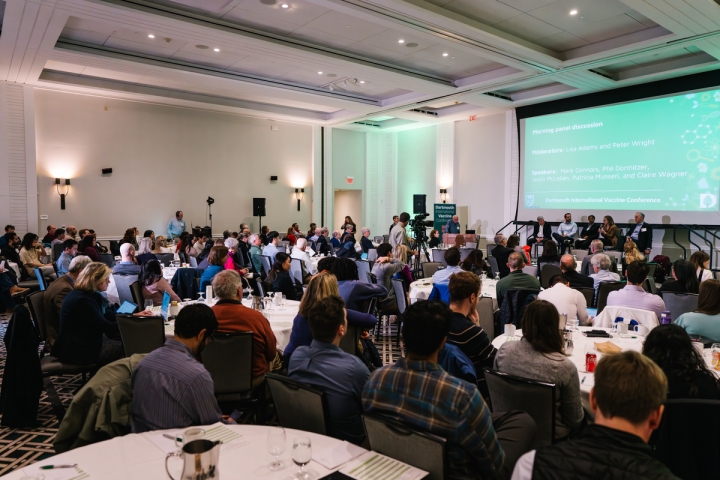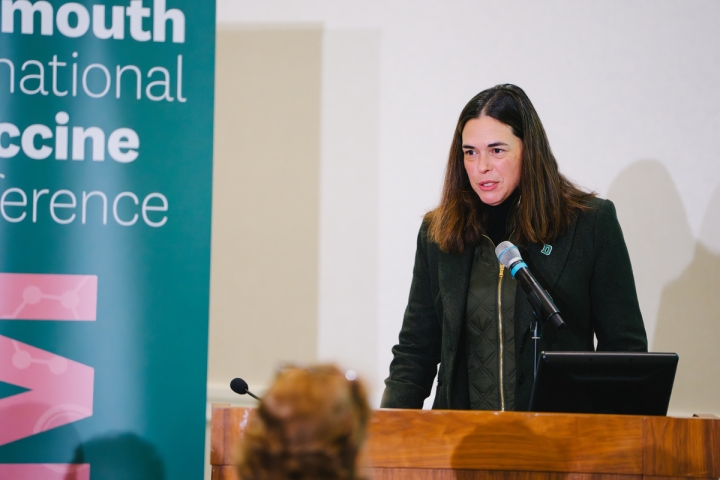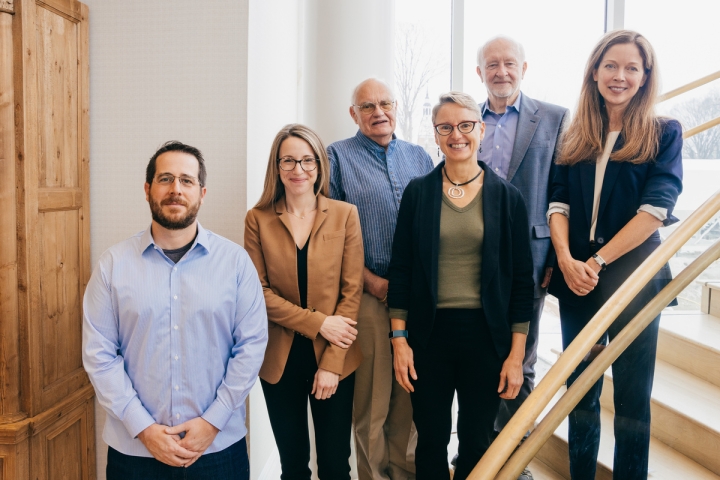Speakers at the first Dartmouth International Vaccine Conference on Wednesday stressed the importance of interdisciplinary coordination to bring clinical research breakthroughs to the public in a timely, effective manner.
“You can have the safest and most effective vaccine in the world, but it does not do anyone any good if you can’t get enough of them to the right people, in the right place, at the right time,” Kendall Hoyt, faculty director for the Dickey Global Health Initiative’s Pandemic Security Project and an assistant professor of medicine at the Geisel School of Medicine, said in her opening remarks.
The conference, held at the Hanover Inn, was attended by more than 200 people and brought together experts from academia, foundations, industry, and government to discuss how to turn vaccines into vaccinations.
Speakers covered a wide range of topics including advances in vaccines that target diseases like COVID-19, polio, tuberculosis, and measles among others, how bigger data and new approaches to medical trials could help develop vaccines for challenging pathogens like HIV; the crucial roles of industry and academic vaccine institutes in this space; and the challenges of vaccine misinformation and politicization.
Developing new vaccines and creating the conditions that allow widespread and equitable vaccine access to happen is the ultimate interdisciplinary problem, said Hoyt, one of two conference co-chairs.

Dartmouth is uniquely poised, she said, to create a space for interdisciplinary problem-solving and to integrate leading-edge science with upstream design and a social science research agenda to shape demand, increase access, and reduce hesitancy.
Delivering welcoming remarks at the event, President Sian Leah Beilock emphasized the importance of vaccine research and reaffirmed Dartmouth’s commitment to impact and innovation.
The work of turning vaccines into vaccinations is “not just about the science, but it’s about how we deliver that science, how we think about access, how we think about education, how we center equity,” said Beilock.
As a tight-knit community that syncs across boundaries and across different areas of expertise, Dartmouth can lead the way in addressing these important challenges, Beilock said.
The keynote was delivered by structural biologist Jason McLellan, a former Geisel assistant professor who is now a professor of molecular sciences and the Robert A. Welch Chair in Chemistry at the University of Texas at Austin. McLellan received the inaugural McGuire Family Prize for Social Impact from Dartmouth in 2022.
In introducing McLellan, Geisel Dean Duane Compton said, “It’s probably not an exaggeration to say that that we might still be searching for a solution to the COVID pandemic without his discovery.”
McLellan described his work at Dartmouth on the development of a method to stabilize coronavirus spike proteins for use as vaccine antigens, which serves as the foundation for COVID vaccines currently used in the U.S. and Europe.
“We’re always really pleased that something that we were working on here at Dartmouth has ended up being widely used,” McLellan said.
McLellan’s lab subsequently created a second-generation spike protein called HexaPro that forms the basis for more affordable COVID-19 vaccines that will be more broadly accessible to people in middle- and low-income countries. He also highlighted ongoing efforts to engineer pan-coronavirus vaccines, a universal vaccine that will protect against all coronaviruses that could affect humans.
The keynote lecture was named after Samuel Katz ’48, MED ’50, a virologist who was credited with developing the measles vaccine used throughout the world today. Following the keynote, his life-saving research and his connection to Dartmouth were celebrated by his son David Katz and Peter Wright ’64, MED ’65, an infectious disease and international health physician and professor of pediatrics at Geisel.

Dartmouth’s legacy in vaccine research as well as ongoing work on new vaccines were underlined in several talks that highlighted key contributions made by Dartmouth researchers and alums to vaccines against measles, tuberculosis, polio, and COVID-19 among others.
Speakers included Dartmouth faculty members David Leib, a professor of microbiology and immunology at Geisel who detailed efforts to prevent neonatal herpes simplex virus infections through maternal vaccination; Margaret Ackerman, a professor of engineering who pioneers novel approaches to design vaccines against challenging pathogens like HIV; and Brendan Nyhan, a professor of government who illustrated how messaging can influence vaccine acceptance.
“We are delighted to see such an enthusiastic response to today’s conference, which reflects the work of 10 faculty members over the last two years,” said conference co-chair Ford von Reyn ’67, MED ’69.
An infectious disease specialist and a professor of medicine at Geisel who led the development of the Dartmouth TB vaccine, DAR-901, von Reyn concluded the program with a vision for a vaccine institute at Dartmouth that would “join Dartmouth institutions to advance the development of vaccines of national and global importance and lead in promoting vaccine equity and acceptance.”
By combining basic science, clinical science, engineering and business expertise with a focus from the beginning on access and acceptance, and by an expansion of the successful ongoing collaboration with Tanzania on bi-directional research and training programs focused on HIV and TB, the institute would be able to address major issues in vaccine development, access, and acceptance, von Reyn said. He concluded with the hope that the conference “will mark the beginning of an exciting new level of vaccine research and education at Dartmouth.”
Video from the conference is expected to be posted online at a later date.
In addition to Geisel and the Dickey Center, the conference was sponsored by the Jack and Dorothy Byrne Foundation, the Department of Microbiology and Immunology at Geisel, the Center for Health Equity, the Dartmouth Health Section of Infectious Disease and International Health, the Center for Health Care at Tuck, and the Dartmouth Health Department of Pediatrics.
